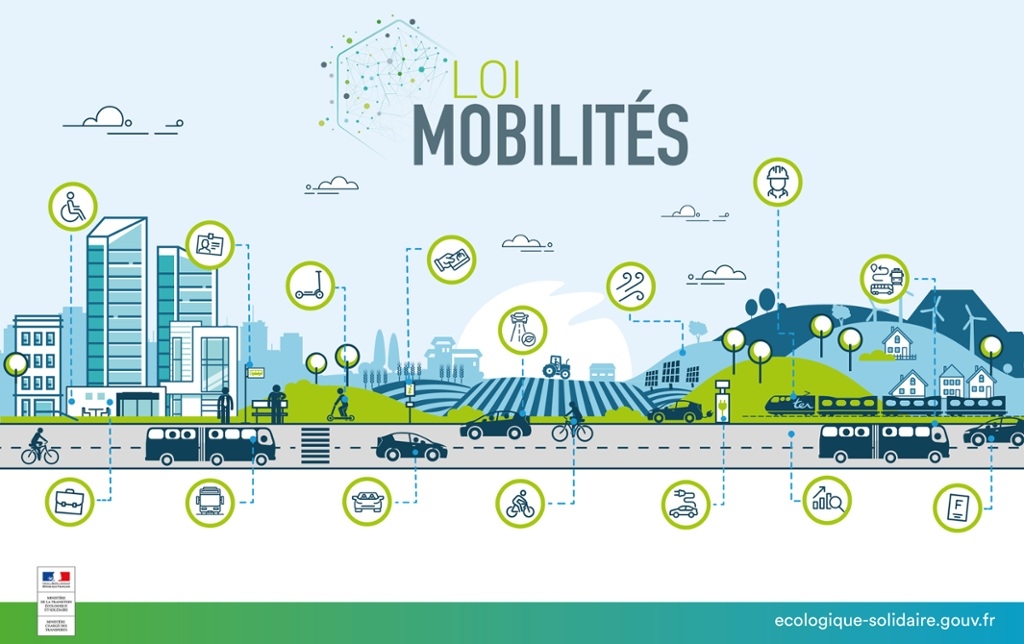
After more than a year of discussion, the Law on Mobility Orientation (LOM) was definitively adopted by the French Parliament on 19 November. It wishes to improve the daily journeys of the French people, by putting the environmental issue at the centre of the discussions.
For more than two years, Mobivia, Via ID and its startups have contributed to the implementation of this law, first within the Assises de la Mobilité, then in the France Mobilités approach (of which we are members of the strategic committee) and finally in the monitoring of the law’s progress.
We welcome a constructive collaborative approach that has involved public and private stakeholders in a fundamental reflection process aimed to enhance everyday mobility and innovation.
Changing everyday transport habits in a sustainable way
The LOM was voted to solve transport inequalities and promote the practice of soft, sustainable and shared mobility.
With a planned budget of more than 13 billion euros to be invested until 2022, the LOM wishes to give priority to the maintenance of infrastructure and the development of everyday transport. It also aims to better serve sparsely populated areas: the implementation of new sustainable and accessible transport solutions for all and in all areas (carpooling, autonomous shuttles, transport on demand, etc.).
Key decisions taken under the LOM
- The definition of cycling as a transportation mode in its own right, good for health and the environment. A “bicycle plan” has therefore been considered with the aim of tripling bicycle use by 2024. To this end, the LOM provides for measures to reduce bicycle theft, the introduction of courses at primary school to “know how to ride”, the establishment of cycle paths in the event of roadworks in urban and peri-urban areas, but also equipment for trains and buses with storage space for bicycles, in order to promote intermodality.
- The development of infrastructure such as bicycle paths, both in urban and rural areas, to enable safe and well-defined journeys for bicycle users.
- The definition of carpooling as a real daily transport solution. The LOM would like to see the possibility for local authorities to subsidise carpooling, whether for the driver or the passenger, or the creation of traffic lanes reserved for carpooling on major roads. Indeed Julien Honnart, CEO of Klaxit, has been very involved in the reflection related to these new measures aimed at developing carpooling between home and work.
- Implementation of a “mobility package” to encourage the use of new mobility solutions (carpooling, cycling, and other shared mobility) for commuting to and from work. This package will allow employees to take advantage of assistance from their employers to finance their carpooling, cycling or other shared mobility (to be specified). This fixed price can be up to 400€/year and replaces the bicycle mileage allowance.
- The definition of new rights for VTC drivers, deliverers and platforms: in particular the right to refuse certain orders, the right to disconnect, the right to know the price before taking a trip, etc. In addition, the LOM wishes to encourage the establishment of better working conditions for drivers and delivery staff.
- Increasing the number of charging points for electric cars (to be multiplied by 5 by 2022), in order to avoid the use of polluting vehicles as much as possible.
- The desire to stop the sale of fossil fuel vehicles by 2040 (diesel cars and trucks), in order to reduce the impact of combustion engines on health and the environment and to promote the adoption of electric vehicles.
- The opening of dynamic and static data (stops, timetables, fares, accessibility data) of transport operators, but this will not concern VTCs or car-sharing. The aim is to facilitate access to information for users through the development of new mobility services.
- The development of MaaS, multimodal transport platforms that will bring together all mobility offers within a single application. The AOMs (mobility authorities) will now be required to offer a multimodal route calculator that will allow all users to access all transport (public or private). These services may be developed by third parties, but constraints must be respected, such as compliance with the pricing decided by the AOMs.
- The regulation of free floating now allows local authorities to regulate self-service scooters on their territories, through the delivery of occupation title. This means that distributors of free-floating services will have to respect some security and quality rules. Communities may limit the numbers of deployed devices, and also refuses some free-floating services on their territories if they so wish.
The Mobility Orientation Law provides a strong response to the social divisions and sense of injustice experienced by many French people who do not have a satisfactory mobility solution on a daily basis, as well as to the environmental emergency
The application of this law will directly impact the activity of some of our startups (accelerated and incubated) such as Klaxit for carpooling at work, Smoove for self-service bike rental, TrackAp for bike tracking in case of theft, Altermove for buying a bike, or You2You for the delivery of the last carbon-free kilometer.
Some important aspects, which are covered by directives, circulars or ordinances, have yet to be produced and we remain vigilant to avoid misrepresenting intentions, particularly with regard to the protection of personal data.
This law includes major advances to facilitate the deployment of sustainable mobility solutions for everyone on a daily basis: MaaS, data opening, mobility packages, etc. A framework that should enable the startups we support to offer solutions to citizens on a daily basis. As Jean-Baptiste Djebbari, Secretary of State for Transport, testified during his visit to Moove Lab, our startup acceleration program at Station F: ambitious entrepreneurs are addressing the mobility issues of citizens, whether urban or rural, listening to them and unlocking regulatory barriers is key to enabling them to achieve their ambitions
All these decisions are present among many others.

